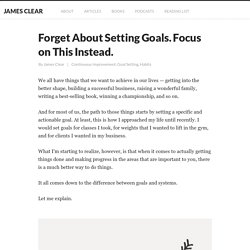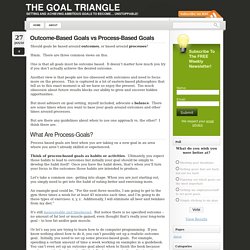

Forget About Setting Goals. Focus on This Instead. We all have things that we want to achieve in our lives — getting into the better shape, building a successful business, raising a wonderful family, writing a best-selling book, winning a championship, and so on.

And for most of us, the path to those things starts by setting a specific and actionable goal. At least, this is how I approached my life until recently. I would set goals for classes I took, for weights that I wanted to lift in the gym, and for clients I wanted in my business. What I'm starting to realize, however, is that when it comes to actually getting things done and making progress in the areas that are important to you, there is a much better way to do things.
It all comes down to the difference between goals and systems. Let me explain. The Difference Between Goals and Systems What's the difference between goals and systems? If you're a coach, your goal is to win a championship. Now for the really interesting question: Why Successful People Don't Set Goals and You Shouldn't Either. Welcome to Forbes.
Why goal setting doesn't work. Despite the popularity of goal setting, there is compelling evidence that regardless of good intentions and effort, people and organizations consistently fall short of achieving their goals.

More often than not, the fault is attributed to the goal setter. But the real problem may be in the efficacy of goal setting itself. The Center For Disease Control estimates that 34% of Americans are overweight and a further 34% are obese, which means almost 70% of the population are dangerously unhealthy. A curious result, despite the proliferation of weight loss programs that usually focus on weight-loss goals. The easy explanation would be to attribute fault to lack of will or effort. In the early 2000's , General Motors had set a goal to capture 29% of the American auto market. Our society, at both the individual level and in organizations, has an obsession with goal setting, particularly "stretch" goals or "audacious goals.
" Why Goal Setting Doesn't Work. We have all heard this advice: Set goals if you want to accomplish anything substantial.

That advice comes from personal coaches, self-help gurus, management consultants, managers and executives and is deeply imbedded in leadership practices. In organizations, “stretch goals,” or “hairy audacious goals,” as a management motivational and performance strategy, is widely practiced. Yet, there is evidence that goal setting may actually be counter productive if not a waste of time. Our society, at both the individual level and in organizations, has an obsession with goal setting, particularly "stretch" goals or "audacious goals. " We tie goals to accomplishment. The following is a typical template for goal setting: Write down the goals;Make goals specific and clear;Indicate how you’ll measure goal accomplishment;Have goal timelines and deadlines;State goals in terms of specific outcomes or results;Attach rewards, incentives for attainment and punishment for failure.
Outcome Based Goals vs Process Based Goals. Outcome-Based Goals vs Process-Based Goals Should goals be based around outcomes, or based around processes?

Hmm. There are three common views on this. One is that all goals must be outcome based. It doesn’t matter how much you try if you don’t actually achieve the desired outcome. Another view is that people are too obsessed with outcomes and need to focus more on the process. But most advisers on goal setting, myself included, advocate a balance. But are there any guidelines about when to use one approach vs. the other? What Are Process-Goals? Process based goals are best when you are taking on a new goal in an area where you aren’t already skilled or experienced. Think of process-based goals as habits or activities. Let’s take a common one: getting into shape. An example goal could be, “For the next three months, I am going to get to the gym three times a week for at least 45 minutes each time, and I’m going to do these types of exercises: x, y, z. It’s still measureable and timebound.